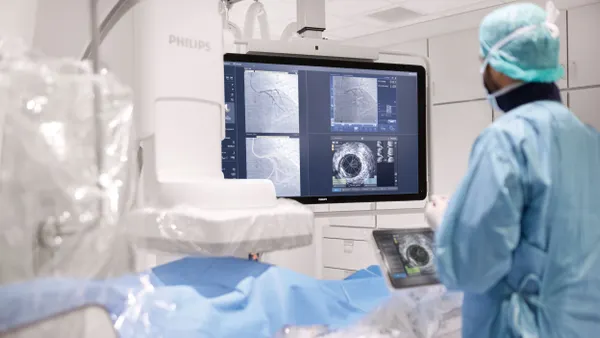Dive Brief:
- SynCardia, maker of the temporary Total Artificial Heart for patients with end-stage biventricular heart failure, has responded to an FDA letter apprising physicians of higher death and stroke risks associated with the device’s Companion 2 (C2) driver.
- FDA earlier this month informed transplant surgeons and cardiologists that a post-approval study comparing the C2 driver with its predecessor showed higher rates of death and stroke with the newer system.
- SynCardia, in a response sent to its clinical partners, argued the C2 driver has not been identified as the root cause of increased mortality and stroke rates.
Dive Insight:
SynCardia's artificial heart offers a bridge-to-transplant option for patients awaiting a donor heart who are at risk of dying or becoming too sick for the procedure. The device replaces a patient's own ventricles and valves, taking over the pumping of blood. The external pneumatic driver activates the implanted device.
FDA's Aug. 17 letter to physicians said survival for patients with the C2 driver was significantly lower than survival for patients with SynCardia’s earlier driver, the Circulatory Support System (CSS) console. At three months, 65.5% of patients survived with the C2 driver, compared with 77.5% of patients using the CSS console. At six months, 60% of patients survived with the C2 driver, compared with 74.2% on the CSS console.
SynCardia said no primary cause of death in the C2 cohort was the result of a device malfunction. The data show the C2 driver is as reliable as the CSS console, and most strokes occurred within the first three months of the implant, SynCardia said.
The company believes more strokes occurred soon after the procedure due to the pre-implant condition of the patients. It also noted that patient duration on the C2 driver did not increase the rate of adverse events.
An analysis of the C2 cohort found pre-implant risk factors such as age, dialysis and tricuspid regurgitation, among others, had a statistically significant impact on mortality, while issues including a history of atrial arrhythmia, recurrent stroke and ischemic dilated myopathy were among those associated with stroke, according to the company.
"We stand behind the C2 Driver as the hospital driver used to support SynCardia TAH-t patients," the company said.
SynCardia said it will collaborate with FDA on study design improvements for the second phase of its post-approval analysis. That study will scrutinize patient pre-implant conditions in more depth and will include a subset of patients who transfer to the portable Freedom driver system for use outside of the hospital, the company said.











